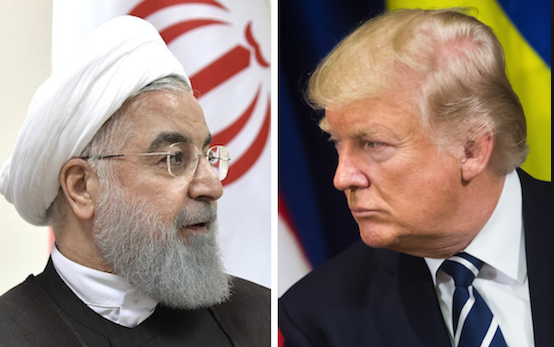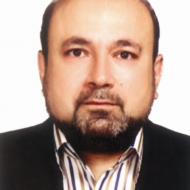Ahead of Hassan Rouhani’s visit to New York, Donald Trump tweeted about the Iranian president saying: “I am sure he is an absolutely lovely man!”
It is a tradition for US presidents to welcome leaders who visit New York while participating in the UN General Assembly, but as everyone knows, Trump does not always like to abide by the traditions… he has his own way of sending messages to other world-leaders.
Last year Trump mocked North Korean leader Kim Jong Un “Rocket Man”, and then this year Trump said that he considered Kim to be “a very good young man”.
It is often hard to understand how politicians change their views from one day to the next, but it seems that as far as president Trump is concerned, he is simply trying to invest his business experience into politics.
Against all protocols and traditions for UN General Assembly meetings, Trump arrived late, and then dedicated a large part of his speech to admiring the work he has done for the US in his first two years, saying he has done what other US presidents couldn’t do in centuries. He then went on to threaten other countries in attendance, saying that the US comes first for him, and all other countries should behave according to US interests, and also suggesting that if they don’t behave accordingly, they will face US sanctions or lose their protection. The speech was essentially a threat that the US is ready to employ economic terrorism to get its way.
Trump didn’t even spare US allies. When he threatened revenge on OPEC if they don’t decrease the price of oil, he was also threatening Persian Gulf Arab countries which are considered to be US allies.
His threats came off as humorous to most of the audience who burst into laughter during the speech; we should consider this the world-leaders answer to Trump’s posturing.
It seems that nobody told Trump that the main reason leaders from all over the world gather in New York for the General Assembly is to talk about their efforts to reach world peace, not to be threaten and intimidate each other.
Trump also heads the Security Council, and, though the meeting was about weapons of mass destruction, he mostly talked about Iran in his opening speech. 14 out of 15 members of the Security Council rejected America’s recent actions against Iran, and criticized the decision to abandon the JCPOA.
The speech was considered to be an international failure, both for the American president and US foreign policy.
On the other side, President Rouhani, a veteran politician, didn’t need to spend a lot of effort answering Trump’s provocations: Trump’s behavior and speech at the meeting essentially spoke for him.
In his speech, President Rouhani called for the US to keep its agreement regarding Iranian nuclear power which was known as the Joint Comprehensive Plan of Action (JCPOA), and to return to the negotiating table rather than resorting to economic pressure.
Anyone who follows domestic politics in Iran will tell you that Iranian society is currently in the midst of a crucial debate about the country’s future.
One group of politicians believe that talks and negotiations with the US are a waste of time, while the second group believes that such diplomatic efforts are the best way to help resolve hostilities with Washington
President Rouhani and Iranian Foreign minister Mohammad Javad Zarif belong to the second group, and were pushing for diplomatic options until a few months ago– critically, the leaders were also garnering the support of the population to pursue such policies. Now, however, after Trump’s decision to withdraw from the JCPOA, the First group is growing stronger in Iran and the second group has been pushed into the corner.
Today, it is nearly impossible for any politician in Iran to even talk about new negotiations with the US, with critics pointing to the lack of results from previous agreements.
Others have leveled criticism against diplomatic efforts saying something like:
”How could you guarantee that any new agreement will actually be implemented if a new president can simply come along and cancel the deal because he/she doesn’t agree with it?”
In his speech, president Rouhani seemed to be directly responding to Trump’s tweets, telling him that, if he wants to enter new talks with Iran, he should prove that he can be trusted and that any new deals will actually be implemented.
Of course, the only way for Trump to prove that he is trustworthy in this regard is to reinitiate the JCPOA and suspend sanctions against Iran.
President Rouhani knows that this is a very unlikely decision for Trump to make, but he also knows that Trump is currently facing domestic and international pressure due to his erratic behavior, and that a meeting between he and Trump will need to take place before midterm elections.
Trump should also understand that Rouhani needs the US to reboot the JCPOA and suspend sanctions so that he will have a winning card to use against those who believe that talks with US are useless.
Though many only noticed the harsh words that were exchanged, those who pay close attention will recognize that Trump’s complimentary Tweet was a message for Rouhani that some agreement is possible, and when Rouhani discussed terms for the US to come back to the negotiating table, he was also positing a potential move forward.
The previous talks began after ex-US President Barack Obama sent a message to Ayatollah Khamenei and ex Iranian President Mahmoud Ahmadinejad telling them to attend the UN General Assembly, saying he was ready to meet to discuss the differences between the two countries.









Leave a Reply